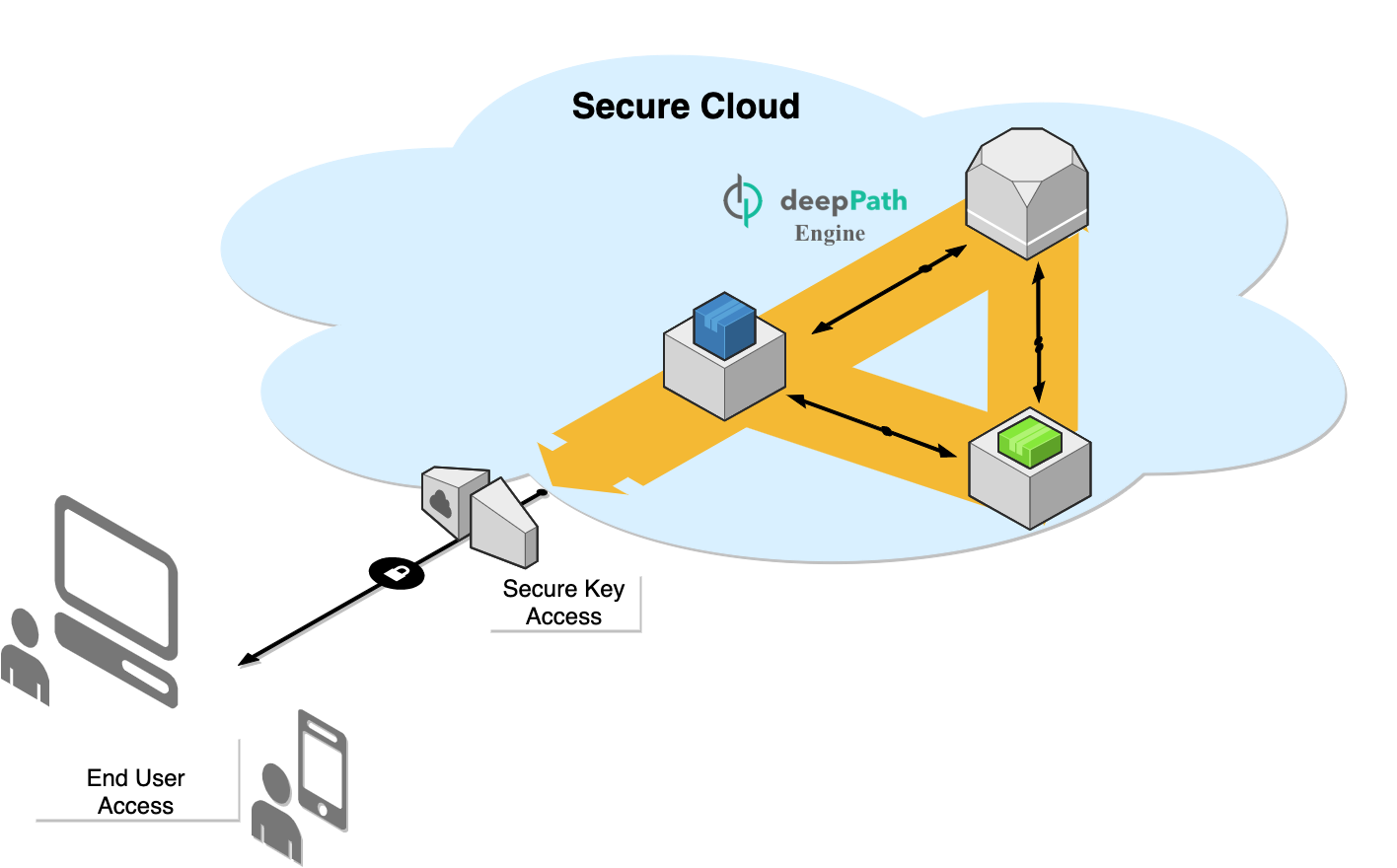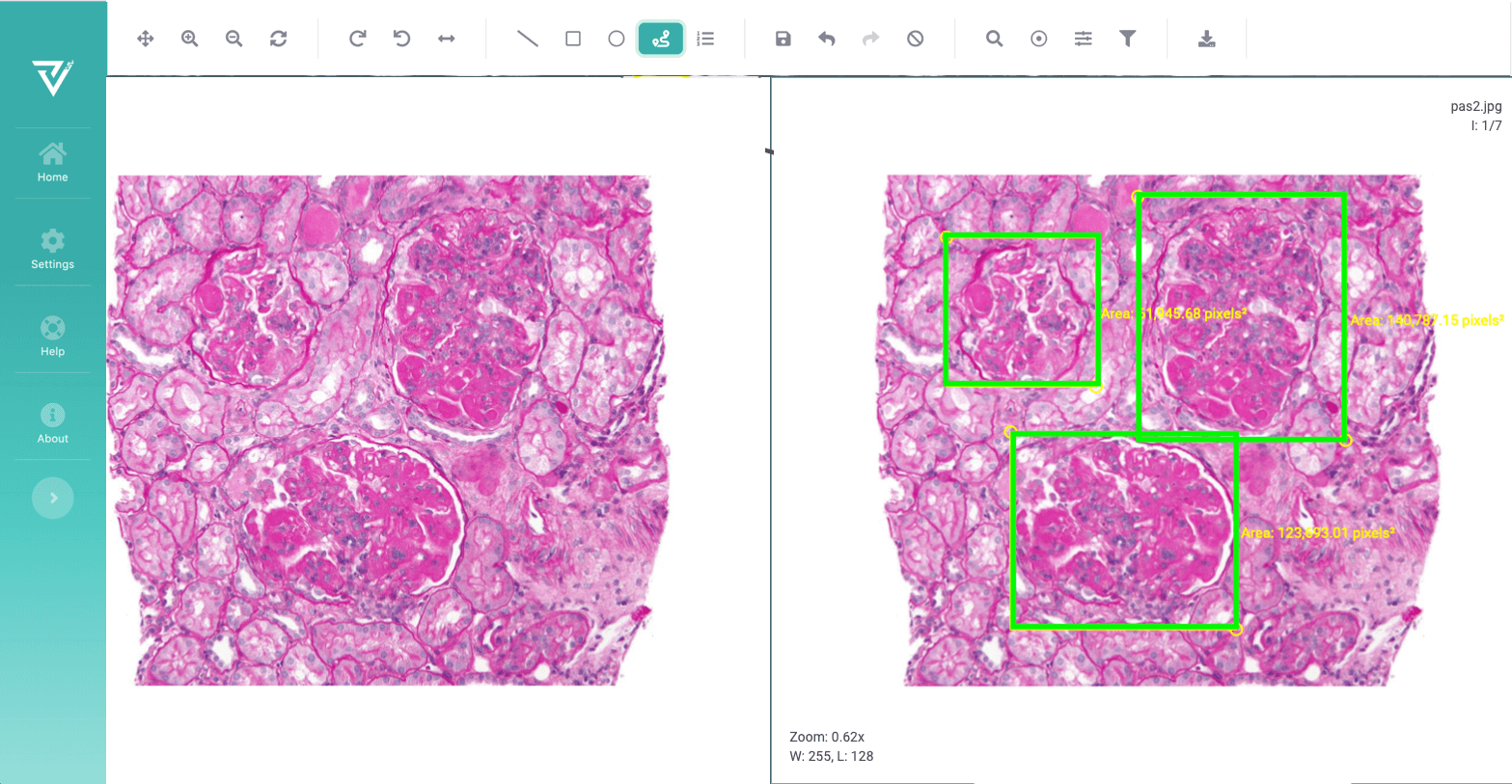Chronic kidney damage is routinely assessed semiquantitatively by scoring the amount of
fibrosis and tubular atrophy in a renal biopsy sample. Although image digitization and
morphometric techniques can better quantify the extent of histologic damage, we need more
widely applicable ways to stratify kidney disease severity.
Read complete publication...
Our Platform
deepPath™ is a scalable, AI-based image analysis platform for digital pathology. With a comprehensive set of image editing capabilities and "plug and play" machine learning modules, our platform provides an extremely flexible tool for the end user to assist in assessment of various diseases.
Our cloud-based infrastructure provides “anywhere, anytime” access to the end user. It also supports collaborative image management capability. This assists users of a group or organization to manage and share data seamlessly.

Cloud based
deepPath product suite is deployed in a secure, cloud-based environment for anywhere, anytime access to the end-user. It is operating system agnostic and device independent enabling us to embed it seamlessly in any customer workflow.
HIPAA compliant
Our solution is fully HIPAA compliant making it an ideal environment for anyone dealing with protected patient data. Access is secure and content is encrypted in addition to all other requirements needed for compliancy.
Collaborative
Cloud deployment allows for collaboration between multiple users within a group and between groups regardless of their geographical location. Ability to set independent permissions for individual users and groups provides significant flexibility.
Configurable
We do not believe in "one size fits all". While most of the standard features are universal and the end-user has access to a wide range of settings, we provide customizations to suit our customer needs.
Our Products
PixelView™
deepPath's PixelView image viewing and annotation software supports whole slide images and all OpenSlide formats in addition to several other standard image formats.
It's intuitive and easy to use interface can handle gigabyte size images without compromising on user experience. It is interactive, fast, and powerful for annotating high resolution digital pathology images.
Request More InfoWhole slide images
Whole slide images (WSI) continue to gain traction among pathologists for diagnostic, educational, and research purposes. PixelView supports extremely large, high quality images without compromising on the ease of use.
OpenSlide formats
PixelView supports a wide variety of OpenSlide formats such as Aperio (.svs, .tif), Hamamatsu (.vms, .vmu, .ndpi), , and Generic tiled TIFF (.tif) among many others. We are also constantly adding more formats on an ongoing basis.
Annotations
Freehand, ellipse, rectangle, and other fundamental annotation tools are readily available out of the box for annotating virtual slides. Annotations can be differentiated by color coding and tagging. They can be used for training new machine learning models.
Image quality
Image quality metrics such as BRISQUE and entropy can be obtained on demand for the whole image or part of an image. This plays a significant role in quantitatively determining an image's quality.
AI Capsules™
We provide AI-based deep learning models (AI capsules) for automated analysis of digital biopsy images to identify a diverse set of pathological descriptors.
deepPath AI capsules can assist in Identification and segmentation of anatomic structures that can lead to prediction of various outcomes of interest applicable to multitude of use cases.
Request More Info
Objective assessment
The ML models can deliver real-time capability for objective and consistent analysis of the extent of organ-level damage and accurate prognosis of tissue function.
Seamless integration
We provide customers, access to deepPath™ AI capsules using smart APIs. This lets us seamlessly integrate them into existing frameworks and workflows minimizing complexity and avoiding unnecessary overhead.
AI-based
Our advanced machine learning algorithms are based on deep neural networks. Deep learning models are capable of analyzing large datasets within a short amount of time. The algorithms are developed with data obtained from ethnically diverse population.
Peer reviewed
Research leading to our ML models has been peer reviewed by clinicians and other experts in the field. It has been published in international clinical journals and experts shed a positive light on the value proposition.
Use Cases

Academic ResearchCutting-edge analysis
Researchers can directly use our software to annotate and analyze various components of digital pathology images. Sophisticated image editing capability along with AI-enabled features provides users with needed flexibility to quantify various pathologic descriptors.

Drug DevelopmentThe smart way
Our technology can seamlessly work with pharmaceutical companies that are developing novel drugs to treat various diseases. We can assist with outcome prediction and risk assessment during various stages of pre-clinical studies and clinical trials.
Our Customers



What Clients are saying
Team deepPath
Who We Are
A team of entrepreneurs, inventors, academic researchers, physicians and software engineers with a total experience of over 100 years in these fields.
What We Believe In
Providing the most accurate and efficient diagnostic platform by building a comprehensive software that would allow detailed quantitative assessment of various disorders and related outcomes.
What We Do
Our cloud-based software application uses cutting-edge deep learning algorithms to provide 'real-time' solutions at the point-of-care.
Connect With Us
deepPath™ in the News
The ability to quantify the extent of kidney damage and predict the life remaining in the
kidney, using an image obtained at the time when a patient visits the hospital for a kidney
biopsy, now is possible using a computer model based on artificial intelligence (AI).
Read complete article...


